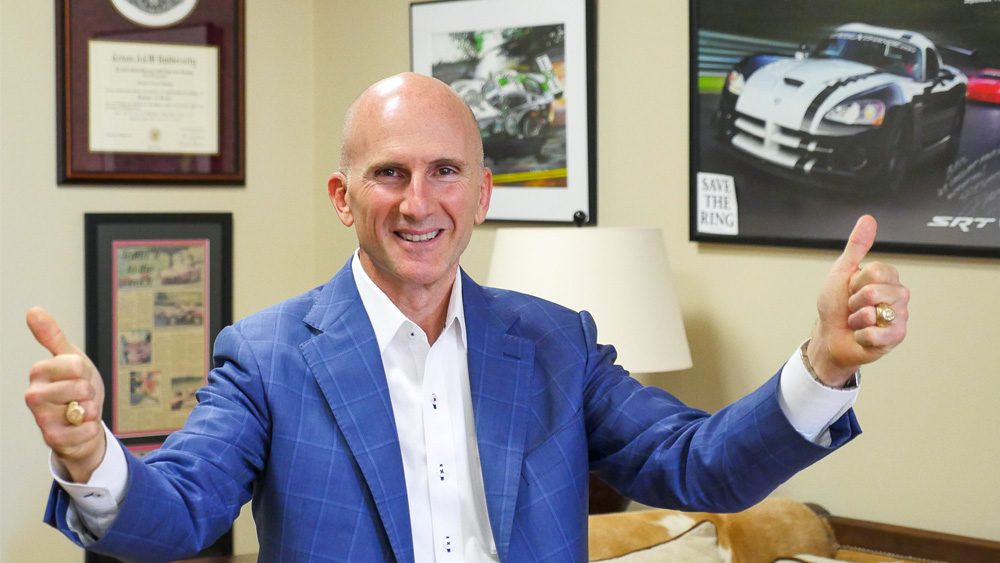
Ben Keating ’94 went to work selling cars at Covert Ford in Austin after graduation. He worked his way through various management roles and purchased a small Ford store in 2002. Over the last 20 years, the Keating Auto Group has grown to 28 dealerships and is the largest privately held auto group in the state. Keating is also a successful racing driver in endurance sports car racing worldwide, winning the Michelin North American Endurance Cup in five of the last six years. He also won the GT-AM class in the 24 Hours of Le Mans in 2022 and 2023 and is the only American racing driver to have won two World Championships in the FIA World Endurance Championship.
What led to your decision to pursue industrial engineering?
I was always better at solving problems than reading and writing. Therefore, I thought engineering would be a good fit for me. As far as which type of engineering, I have always had a business mind and entrepreneurial spirit, and I thought industrial engineering was best suited for business. I am sure some of this decision was rooted in the fact that my father was an industrial engineer, and my grandfather was a mechanical engineer.
Could you say more about growing up with engineers?
As a kid, our family would solve engineering problems during road trips. My father would make up questions about whether or not a giant concrete chicken would float or not. It is amazing to me how much this influenced my self-image as a problem solver.
Could you give me a summary of your career path after graduation?
I love this story. I graduated with honors; I had a great GPA; I was president of the Institute of Industrial Engineers, and at the reception for all the graduating seniors, I stood up at the podium and told everyone that my plan was to become a car salesman. Everyone gasped, and I chuckled to myself.
Why a car salesman?
I had done an internship between my junior and senior years for a company that did training and consulting in the car dealership space. During this internship, I fell in love with the business. My wife, Kathleen, got a job as an engineer for Dell Computer in Austin, and I went to work at Covert Ford selling cars. Six months later, I took a job as a used car manager and eventually worked my way up to general sales manager, working for my father at Tomball Ford. In 2002, I got an opportunity to purchase a failed Ford dealership in Port Lavaca, Texas, and this is where I really got my start in business ownership.
How do you use your degree?
I see all engineers as problem solvers and industrial engineers as efficiency experts. I see both of these things as incredibly useful and one of the main reasons for our growth and success. I tend to “flow chart” our challenges to make sure each person understands what they are responsible for. I enjoy simplifying problems into small bite-size issues and making sure that each person involved is focused on keeping the main thing as their main thing. I think this is fun and rewarding. I literally feel like I use my degree every day, and I don’t know of a better preparation for running a business.
What’s it been like having your own business?
I really do feel like running a business is nothing more than solving problems, which we have done a great job of doing for the past 21 years. We have continued to grow year after year, and we currently own 28 car dealerships throughout Texas, including six in Bryan/College Station. We are the largest privately held dealer group in Texas and ninth in the United States. I give much of the credit to what I learned in industrial engineering at Texas A&M and a ton of credit to all the Aggies I have hired from Texas A&M over the past 27 years. We are a very Aggie-centric organization, and this is a bit of our secret sauce.

When did you start racing?
My first race was in April 2007. It is pretty crazy to think about, but I was involved in a wreck in each of my first six races. I was put on probation because nobody wanted to race with me for fear that I would wreck them. And now, I have just won the World Championship for the second year. I am the only driver to have won the World Championship in two different brands of cars, and I am the only American driver to have ever won multiple World Championships. This was all new for me 16 years ago. There was a steep learning curve, but again, having the engineering background made a huge difference. I was able to read textbooks on driving race cars and translate that knowledge into results on track.
Did you expect to jump from selling cars to racing them?
Negative. I never knew that anyone could take their personal car and drive it on the track in that way. My wife bought me a weekend at the track for Christmas, which is how all of this started. She thought the car dealer would enjoy a weekend playing with cars, but she had no idea what this would turn into. Having said that, I definitely believe that selling cars has given me a few racing opportunities. And for sure, racing cars has helped me sell and service cars. I became a Dodge Viper racer long before I became a Viper retailer, but because of the relationships I developed on the track, I became the largest Viper retailer in the world. People typically enjoy discussing cars with someone who knows what they are talking about, and I have been able to prove this on the track.
What lessons have you learned that you’d like to share?
I see any failure as an opportunity to learn. Therefore, I have learned lots of lessons. From a really big perspective, I have found that the world makes way for the person who knows where they are going. No matter what you choose to do in life, it is going to require long hours and lots of work. Therefore, you owe it to yourself to be passionate about what you do. In no way does this mean you are going to love every day; quite the opposite, actually. Life is difficult. Success takes work. Therefore, it is my hope that I get to spend my time solving problems and doing work that I care about.
What advice do you have for students interested in industrial and systems engineering?
I think industrial and systems engineering is the most well-rounded of all the engineering degrees. It is hard to have the proper perspective when you’re at this stage of your life. But the fact is that few people end up in a career that is dedicated directly to their chosen degree. Therefore, I believe it is the basic principles that you learn that stay with you for the rest of your life. I see the principles learned in industrial and systems engineering as being the most applicable and well-rounded for any career and all walks of life. You can’t go wrong, but industrial engineering is still better.